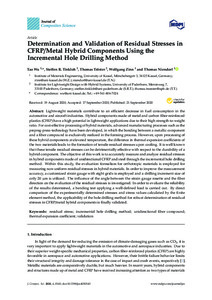| dc.date.accessioned | 2023-07-28T13:07:44Z | |
| dc.date.available | 2023-07-28T13:07:44Z | |
| dc.date.issued | 2020-09-21 | |
| dc.identifier | doi:10.17170/kobra-202307288526 | ger |
| dc.identifier.uri | http://hdl.handle.net/123456789/14946 | |
| dc.language.iso | eng | |
| dc.rights | Namensnennung 4.0 International | * |
| dc.rights.uri | http://creativecommons.org/licenses/by/4.0/ | * |
| dc.subject | residual stress | eng |
| dc.subject | incremental hole drilling method | eng |
| dc.subject | unidirectional fiber compound | eng |
| dc.subject | thermal expansion coefficient | eng |
| dc.subject | validation | eng |
| dc.subject.ddc | 620 | |
| dc.title | Determination and Validation of Residual Stresses in CFRP/Metal Hybrid Components Using the Incremental Hole Drilling Method | eng |
| dc.type | Aufsatz | |
| dcterms.abstract | Lightweight materials contribute to an efficient decrease in fuel consumption in the automotive and aircraft industries. Hybrid components made of metal and carbon fiber-reinforced plastics (CFRP) have a high potential in lightweight applications due to their high strength-to-weight ratio. For cost-effective processing of hybrid materials, advanced manufacturing processes such as the prepreg-press-technology have been developed, in which the bonding between a metallic component and a fiber compound is exclusively realized in the forming process. However, upon processing of these hybrid components at elevated temperature, the difference in thermal expansion coefficients of the two materials leads to the formation of tensile residual stresses upon cooling. It is well known that these tensile residual stresses can be detrimentally effective with respect to the durability of a hybrid component. The objective of this work is to accurately measure and analyze residual stresses in hybrid components made of unidirectional CFRP and steel through the incremental hole drilling method. Within this study, the evaluation formalism for orthotropic materials is employed for measuring non-uniform residual stresses in hybrid materials. In order to improve the measurement accuracy, a customized strain gauge with eight grids is employed and a drilling increment size of only 20 µm is utilized. The influence of the angle between the strain gauge rosette and the fiber direction on the evaluation of the residual stresses is investigated. In order to evaluate the reliability of the results determined, a bending test applying a well-defined load is carried out. By direct comparison of the experimentally determined stresses and stress values calculated by the finite element method, the applicability of the hole drilling method for robust determination of residual stresses in CFRP/metal hybrid components is finally validated. | eng |
| dcterms.accessRights | open access | |
| dcterms.creator | Wu, Tao | |
| dcterms.creator | Tinkloh, Steffen Rainer | |
| dcterms.creator | Tröster, Thomas | |
| dcterms.creator | Zinn, Wolfgang | |
| dcterms.creator | Niendorf, Thomas | |
| dcterms.extent | 19 Seiten | |
| dc.relation.doi | doi:10.3390/jcs4030143 | |
| dc.subject.swd | Eigenspannung | ger |
| dc.subject.swd | Wärmeausdehnung | ger |
| dc.subject.swd | Kohlenstofffaserverstärkter Kunststoff | ger |
| dc.type.version | publishedVersion | |
| dcterms.source.identifier | eissn:2504-477X | |
| dcterms.source.issue | Issue 3 | |
| dcterms.source.journal | Journal of Composites Science | eng |
| dcterms.source.volume | Volume 4 | |
| kup.iskup | false | |
| dcterms.source.articlenumber | 0143 | |


